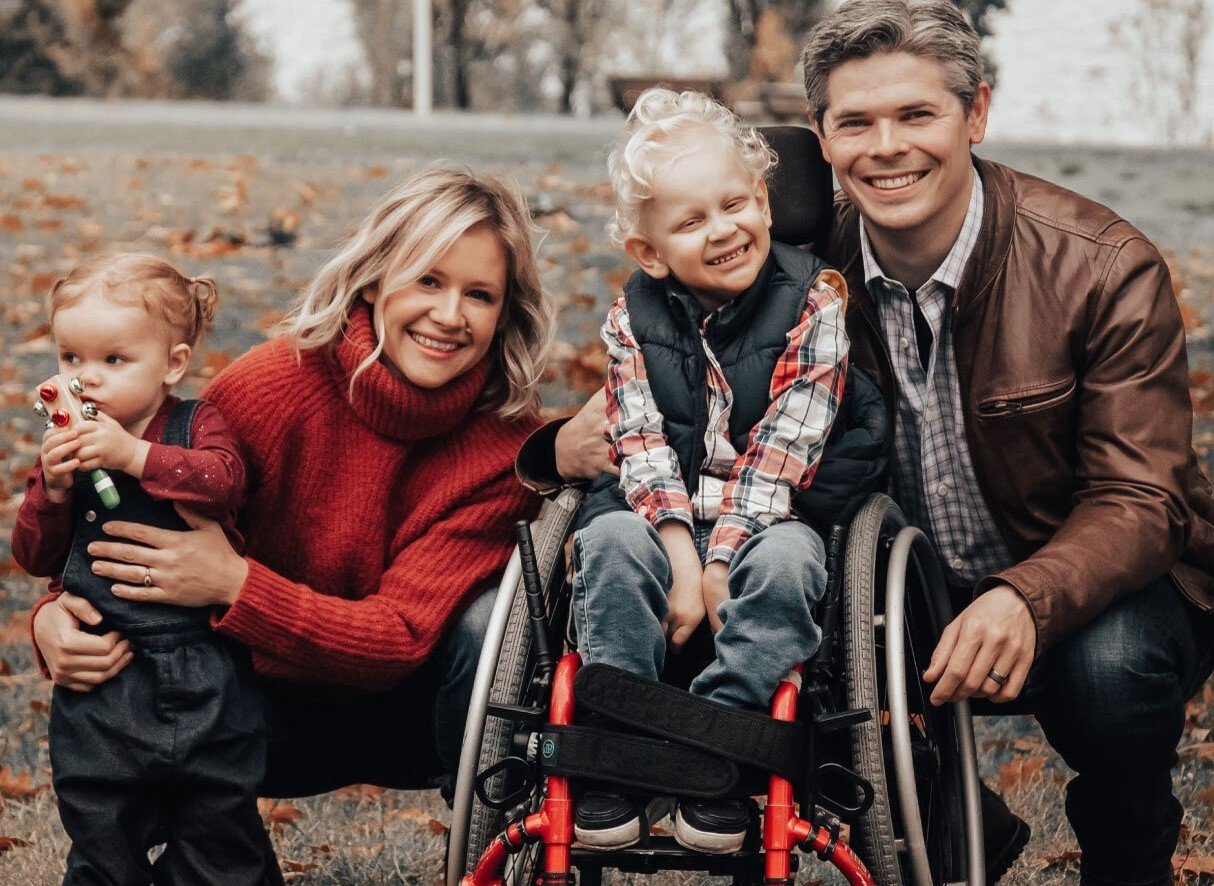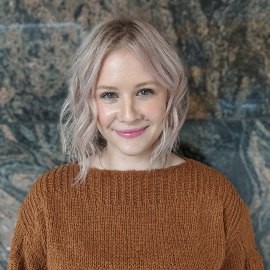
The Parks family – Casey, Effie, Ford & Esne
Effie Parks is like so many parents of children with rare diseases. She does not have a medical background. She was a new mom, with many questions about being a mother to her firstborn, and was then confronted with the realization that something was not right with her baby. Like many parents of children with rare diseases, she did not give up until she found an answer, and then she kept asking questions and asking for more information. She ended up starting a podcast, Once Upon a Gene, to help her cope with being a parent of a child with a rare disease, and to get the answers to her questions.
When Ford was born, he had a hard time feeding, and had a very low birth weight. Effie and her husband were told it would get easier when they got home, but he still wasn’t latching or able to feed with a bottle. They went to the pediatrician and lactation specialist weekly, and during their final appointment with the pediatrician, they were told to go to the local children’s hospital right away because it was obvious that there was something wrong with Ford.
Effie and her husband were fortunate in that they both had maternal and paternal leave, and that they had access to a children’s hospital in Seattle. Ford was diagnosed with failure to thrive after a week stay at the hospital and many diagnostic tests. The doctors told them that he needed a feeding tube, and used terms that Effie was not familiar with yet, like hypotonia (low muscle tone). Ford still needs a feeding tube to this day.
The hospital set them up with a geneticist, who ordered a genetic test right away. The geneticist suspected Hermansky-Pudlak syndrome, a form of albinism, and then ordered a sequencing test. It took 9 months to get results, which gave them a different answer – CTNNB1, which the geneticist said that only 30 children had been diagnosed this condition. Ford’s diagnosis came when he was around a year and half old in 2017. The geneticist said that the only thing that was known about this disease is that some children can say a few words, and some can take a few steps.
“The doctors tell you there’s only so many kids that are like yours. There’s no research, and no name, but go home and love your kid. They don’t say, you’re a part of the rare disease community — here are some resources.” Effie said, “You just feel like you don’t have a place.”
Effie was lost with what to do next. At that point, she had not gotten to the point of doing research within the rare disease community to find support or ask for advice. She did not know about support groups for the condition, and was not familiar with the Facebook community for rare diseases. She did a quick internet search, but did not find anything about the condition because there was not enough traffic for CTNNB1. She searched on Facebook, and that’s where she found a support group for CTNNB1.
The Facebook group was eye-opening for Effie. She found that there were actually 50 patients, and they all looked like Ford. There was no information on the prognosis for the disease since the gene was identified in 2012, so all of the children were diagnosed after that, and were young like Ford. There was not much to look forward to as far as learning about what Ford’s future looked like, so that was discouraging for Ford’s parents.
What Effie did appreciate about the Facebook group was finding people who were going through the same thing that she was. Her next question was, “This is it? We’re not doing anything? We’re all busy and consumed with taking care of our child, but we didn’t know what to do next.”
Effie was also discouraged because Ford was on the severe end of the spectrum. Other children diagnosed with CTNNB1 were ahead of Ford in most developmental areas.
“It was hard to rely on the Facebook group as my sole community of support,” Effie said. “Even then, it was isolating in my own community because Ford was not like the other children.”
She was driving Ford to doctor’s appointments constantly, so she started looking for podcasts that she could listen to about rare diseases, disabilities, but she didn’t find much, possibly 7. The larger rare disease community was helpful for Effie because people were sharing their experiences, successes, and frustrations. Her friends and family didn’t understand what she was going through, and she realized she had to tell her story to find other people like her.
Effie researched how to start her podcast, and she learned that doing the podcast was therapeutic. She gets so many e-mails that she can’t keep up with her inbox.
“Someone’s story helped them or inspired them. They are going to start a foundation, or they are going to start taking care of themselves. It’s the first time that they feel like someone else gets it. All of these magical things started happening weeks after I started the podcast.”
After Effie started her podcasts, more podcasts started popping up. She is glad that there are so many resources outside of the doctors and healthcare professionals that loved ones and caregivers will encounter during the diagnosis journey for those who are following in her and Ford’s footsteps.
She was not aware of Global Genes though, until Daniel DeFabio contacted Effie a month after the podcast launched. Daniel is another parent in the rare disease community, and while he is now the Director of Community Engagement for Global Genes, he wasn’t working with Global Genes yet. He had, however, attended the Patient Advocacy Summit, and also received an award for his blog by then. Global Genes invited Effie to be a panelist at a few online events after the pandemic, and she is now a Community Engagement Coordinator with Global Genes.
“Resources like podcasts are a lifeline.” Effie said, “Decide if you want to be an advocate, decide if you want a passive friendship and to listen to these stories because they help you feel better, decide if you want to learn how to start a foundation. There are so many things that you can put out there for people to grab ahold of in whatever way they need to. This is hard, it’s confusing, and it’s messy. There’s so much content online that you have to sift through. If you can find a point person who can help direct you to places, it’s so much more efficient and valuable than crying your eyes out while you’re Googling stuff.”

Effie is the Community Engagement Coordinator at Global Genes, and host of the Once Upon a Gene podcast.

Stay Connected
Sign up for updates straight to your inbox.
